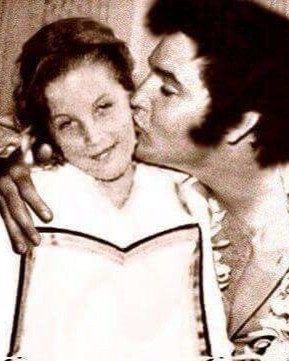
Elvis Presley gave his voice to the world, but he gave his whole heart to just one person — his daughter, Lisa Marie.
She was his only child. The joy he held onto when everything else spun out of control. He dreamed for her the peace he never found for himself — safety, love, happiness far from the noise and pressure of fame.
But even though she was born into the spotlight, the Presley name didn’t shield her from pain. If anything, it made the shadows deeper.
Lisa Marie spent her life walking through both the blessings and the burdens of being Elvis’ daughter. She lost her son — the most painful loss a mother can know. She lost love. She lost trust. She lost the fortune her father earned with every note he sang. Friends came and went. Promises broke. But the ache remained.
People looked at Graceland and saw a palace. A place of gold records, glamour, and legend. Few thought about the girl who grew up behind those gates — the girl who tried so hard to live her own life while carrying the weight of a legacy that never let go.
And then, just days before her own passing, someone thanked her family for the gift of Elvis’ story — not knowing her own story was already nearing its end.
Now, the King is gone. His only child is gone. And his grandson, Benjamin, is gone too. Only his granddaughters remain — left to carry forward a name that once filled the world with music.
Priscilla, once the young bride of a superstar, now stands alone — left to say goodbye to all that was left of him.
When we remember Elvis today, we remember the songs. The charm. The way he made millions feel seen and loved through the music. But maybe we should also remember the quieter side of his life — the truth that love, as deep as his was, wasn’t enough to save the ones he held closest.
Maybe, somewhere inside the walls of Graceland, his voice still lingers — not for the fans, but for his family. For Lisa. For Benjamin. For the peace they all longed for… and finally found.
A few months after Elvis Presley passed away at the age of forty-two, the world mourned the loss of an icon, but his father, Vernon Presley, was mourning something far deeper. For Vernon, the headlines and tributes could never touch the truth of what he had lost. He hadn’t lost the King of Rock and Roll. He had lost the boy he once cradled, the young man he had watched grow, the child who had always been his greatest pride.
In his grief, Vernon poured his heart into a letter for Good Housekeeping. The words were simple, yet they carried the weight of unbearable sorrow. “Elvis’s death was so sudden that it will be years before I’ll be able to accept the fact that it really happened,” he wrote. Each syllable revealed the shock that still clung to him, the disbelief that his son’s laughter and voice had been silenced forever.
Vernon looked back on the day Elvis came into the world, remembering every detail of that long and difficult birth. He confessed in his letter, “My love for my son began even before he was born … Elvis’s birth was long and difficult … I was desolate at the loss of our child.” Even in recalling the struggle of those hours, there was tenderness in his words. It was the kind of memory that only a father could carry, filled with both fear and wonder, and an overwhelming love that would never fade.
But perhaps the most touching words he shared were also the simplest: “I only wanted Elvis to do what made him happy.” There was no pride in fame or fortune, no demand for greatness. There was only the hope that his son could find joy in the life he lived. In that single sentence, Vernon revealed the essence of unconditional love, a love that had carried them both from the poverty of Tupelo to the gates of Graceland, and beyond.
The letter remains a testament to a father’s broken heart, but also to his unshakable devotion. To the world, Elvis Presley will always be a legend. To Vernon, he would always be his boy. And in the quiet ache of his words, we can hear the deepest truth: that no matter how bright the stage lights had shone, the greatest gift was not the music or the fame, but the bond between a father and his son.

